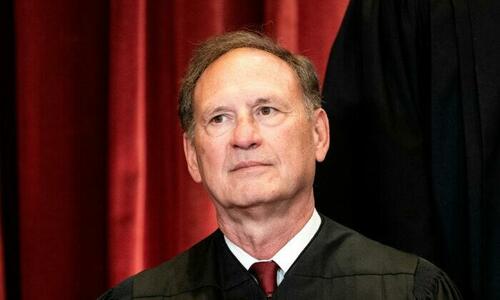Zerohedge
ZeroHedge - On a long enough timeline, the survival rate for everyone drops to zero
The Supreme Court voted 5-4 late on May 31 to temporarily block a Texas law that prevents social media platforms from censoring users based on their political views.
 Supreme Court Justice Samuel Alito poses in Washington on April 23, 2021. (Erin Schaff/Pool via Reuters)
Supreme Court Justice Samuel Alito poses in Washington on April 23, 2021. (Erin Schaff/Pool via Reuters)Known as HB 20, the state law makes it unlawful for tech platforms to restrict or remove content based on “the viewpoint of the user or another person” or “the viewpoint represented in the user’s expression.”
The statute also requires the platforms to establish procedures users can use to appeal a platform’s decision to “remove content posted by the user.” The law applies to platforms that have more than 50 million active monthly users in the United States.
Texas Gov. Greg Abbott, a Republican, signed the bill in September 2021.
The case is Netchoice v. Paxton, court file 21A720.
The applicants are two trade associations representing big tech—Netchoice and the Computer and Communications Industry Association (CCIA). The respondent is Ken Paxton, a Republican who is the attorney general of Texas.
Silicon Valley giants oppose the legislation, claiming it is unconstitutional.
After the new ruling CCIA president Matt Schruers praised the order.
“We are encouraged that this attack on First Amendment rights has been halted until a court can fully evaluate the repercussions of Texas’s ill-conceived statute,” he said in a statement.
“This ruling means that private American companies will have an opportunity to be heard in court before they are forced to disseminate vile, abusive or extremist content under this Texas law.
“We appreciate the Supreme Court ensuring First Amendment protections, including the right not to be compelled to speak, will be upheld during the legal challenge to Texas’s social media law,” Schruers said.
“The Supreme Court noting the constitutional risks of this law is important not just for online companies and free speech, but for a key principle for democratic countries. No online platform, website, or newspaper should be directed by government officials to carry certain speech. This has been a key tenet of our democracy for more than 200 years and the Supreme Court has upheld that.”
The emergency application was filed with the high court on May 13. The opinion was released at the end of the business day on May 31.
The decision cut across the court’s ideological lines.
Liberal justices Sonia Sotomayor and Stephen Breyer joined with conservatives John Roberts, Brett Kavanaugh, and Amy Coney Barrett to slap a hold on the law. The five justices did not explain why they voted to approve the order.
Conservative justices Samuel Alito, Clarence Thomas, Neil Gorsuch, and liberal Elena Kagan voted against granting the order. Alito wrote a dissenting opinion (pdf) which Thomas and Gorsuch joined.
Netchoice and CCIA characterized HB 20 in the application (pdf) as an attack on Silicon Valley companies.
The statute “is an unprecedented assault on the editorial discretion of private websites [like Facebook.com, Instagram.com, Pinterest.com, Twitter.com, Vimeo.com, and YouTube.com] that would fundamentally transform their business models and services,” the document stated.
“HB20 prohibits covered social media platforms [many of which are members of Applicants NetChoice and CCIA] from engaging in any viewpoint-based editorial discretion.
“Thus, HB20 would compel platforms to disseminate all sorts of objectionable viewpoints—such as Russia’s propaganda claiming that its invasion of Ukraine is justified, ISIS propaganda claiming that extremism is warranted, neo-Nazi or KKK screeds denying or supporting the Holocaust, and encouraging children to engage in risky or unhealthy behavior like eating disorders.
“HB20 also imposes related burdensome operational and disclosure requirements designed to chill the millions of expressive editorial choices that platforms make each day.”
Alito rejected the social media platforms’ arguments in his dissent, saying whether the companies’ will ultimately win their case “under existing law is quite unclear.”
“It is not at all obvious how our existing precedents, which predate the age of the internet, should apply to large social media companies,” the justice wrote.
“This application concerns issues of great importance that will plainly merit this Court’s review. Social media platforms have transformed the way people communicate with each other and obtain news,” Alito wrote, referencing a Pew Research Center report from a year ago that stated that more eight out of 10 Americans obtain news from digital devices.
Describing HB 20 as “a ground-breaking Texas law,” Alito wrote that it “addresses the power of dominant social media corporations to shape public discussion of the important issues of the day.”
A federal district judge previously enjoined Texas from enforcing the law but a panel of the U.S. Court of Appeals for the 5th Circuit reversed that order on May 11, as The Epoch Times reported.
Attorneys representing Texas told the 5th Circuit that social media platforms “control the modern-day public square, but they abusively suppress speech in that square.”
A federal judge blocked a similar Florida law, finding it unconstitutional.
